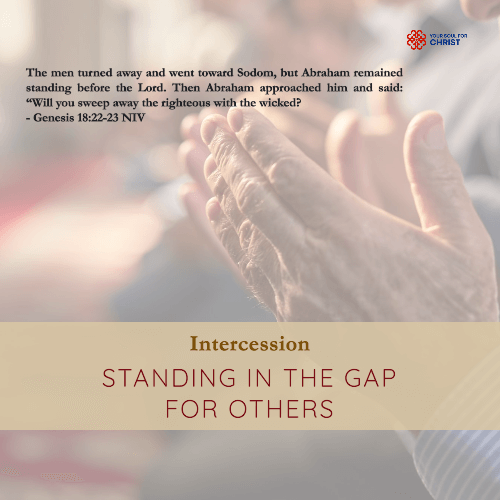The men turned away and went toward Sodom, but Abraham remained standing before the Lord. Then Abraham approached him and said: “Will you sweep away the righteous with the wicked?
Genesis 18:22-23 NIV
In Genesis 18, God planned to destroy Sodom and Gomorrah, but He visited Abraham to inform him of this decision. Abraham’s response was not to accept the information passively but to engage God in intercessory prayer. Intercession, a form of prayer, involves standing in the gap for others and mediating between God and those in need. Abraham didn’t use this revelation for his gain; he interceded for his nephew Lot, pleading for mercy on behalf of the city.
Abraham’s conversation with God highlights the power of intercession. He earnestly prayed for God’s intervention, though Sodom was ultimately destroyed because fewer than ten righteous people were found. This shows how Abraham held fast to God’s hand, seeking mercy on behalf of others.
As believers, when we learn of someone’s struggles, our first response should be prayer, not discussion or gossip. Intercession is our duty, and we are called to pray fervently for others, seeking God’s intervention in their lives. Whether it’s for a backslidden believer or someone who has not yet accepted Christ, our responsibility is to bring their case before God.
The world is in desperate need of intercessors. Through earnest prayer, believers can spark revival, rescuing souls from the grip of the enemy. God searches for those who have His heart, desiring the salvation of men. He is not willing for anyone to perish but for all to come to the knowledge of salvation.
I urge, then, first of all, that petitions, prayers, intercession and thanksgiving be made for all people— for kings and all those in authority, that we may live peaceful and quiet lives in all godliness and holiness. This is good, and pleases God our Savior, who wants all people to be saved and to come to a knowledge of the truth.
1 Timothy 2:1-4 NIV
In these challenging times, believers must take on the mantle of intercession. The world is in disarray, and we must pray not only for ourselves but also for others, for nations, and for those unable to pray for themselves. Missionaries, nations, and lost souls need our prayers.
We must rise to this challenge, forsaking self-centredness and embracing God’s desire to see all people saved. That person who seems too far gone is still within God’s reach, and it is through intercession that they may return. As believers, it is our responsibility to seek their deliverance and salvation through prayer. This is God’s call to us in these times.
